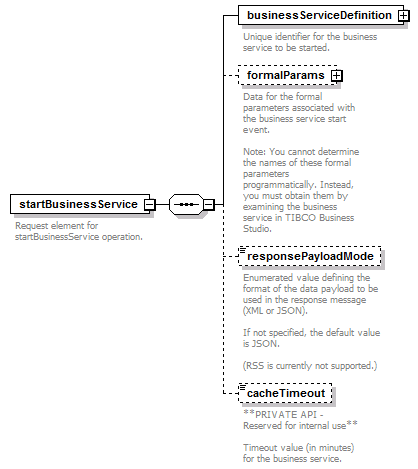| diagram |  |
||
| namespace | http://business.api.busserv.n2.tibco.com | ||
| properties |
|
||
| children | businessServiceDefinition formalParams responsePayloadMode cacheTimeout | ||
| annotation |
|
||
| source | <xs:element name="startBusinessService"> <xs:annotation> <xs:documentation>Request element for startBusinessService operation.</xs:documentation> </xs:annotation> <xs:complexType> <xs:sequence> <xs:element name="businessServiceDefinition" type="pfecom:BaseBusinessServiceTemplate"> <xs:annotation> <xs:documentation>Unique identifier for the business service to be started.</xs:documentation> </xs:annotation> </xs:element> <xs:element name="formalParams" type="df:dataPayload" minOccurs="0"> <xs:annotation> <xs:documentation>Data for the formal parameters associated with the business service start event. Note: You cannot determine the names of these formal parameters programmatically. Instead, you must obtain them by examining the business service in TIBCO Business Studio.</xs:documentation> </xs:annotation> </xs:element> <xs:element name="responsePayloadMode" type="df:payloadModeType" minOccurs="0"> <xs:annotation> <xs:documentation>Enumerated value defining the format of the data payload to be used in the response message (XML or JSON). If not specified, the default value is JSON. (RSS is currently not supported.)</xs:documentation> </xs:annotation> </xs:element> <xs:element name="cacheTimeout" type="xs:long" minOccurs="0"> <xs:annotation> <xs:documentation>**PRIVATE API - Reserved for internal use** Timeout value (in minutes) for the business service.</xs:documentation> </xs:annotation> </xs:element> </xs:sequence> </xs:complexType> </xs:element> |
WSDL documentation generated by XMLSpy WSDL Editor http://www.altova.com/xmlspy